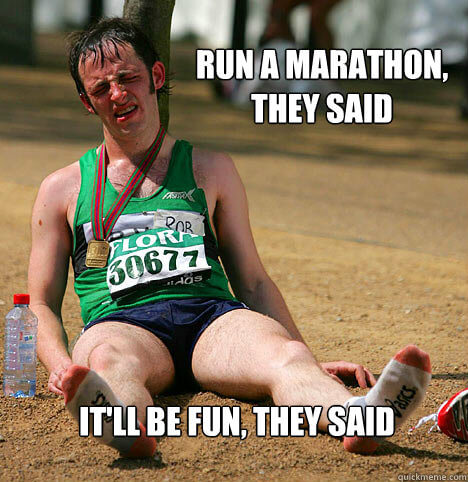Here’s something I’ve learned as a marathoner:
(Ok, I’ve run one marathon, but there are more in my future).
It’s not all about putting one foot in front of the other for hours on end. There’s a physiological science behind marathon training plans so you don’t kill yourself trying to run 26.2 miles. There’s psychological preparation involved: if you don’t toughen up your mental state, your brain will start shutting down your body. Again, this is so you literally don’t kill yourself.

It’s a lot of fun.
Kind of like the SAT.
Segue! See what I did there?
The point I am trying to make is that effective preparation for the SAT (whether it is your first time or fourth time) is about more than drilling yourself with vocab flashcards and plodding through hundreds of math questions, although this is part of it.
If you’re preparing to retake the SAT*, make sure you are focusing on all aspects of the test experience. This means evaluating your previous preparation–academically, strategically, mentally, and physically–and knowing which areas you need to improve to get a better score. It’s whole person preparation.
*Still deciding whether or not to take the SAT again? Check out these related posts! 🙂
Retake Strategy 1: Academically Prepare
Brush Up on Your Weaknesses…
As soon as you can, write down everything you remember about the question types you struggled with on the SAT. Did you want to punch yourself when you couldn’t remember how to reflect that parabola across the origin? Did you guess or omit a lot of vocabulary questions? Did you get lost trying to follow a reading passage? As you continue to practice for your retake, keep a running list of your weak areas so you can practice them more.
If you haven’t done so already, I suggest going through this list of math and grammar topics on the writing section. College Board has a great list for math as well. And, of course, keep reading difficult materials and studying vocabulary. Don’t fall prey to unfamiliar questions again. It’s ok if you are still weak in certain areas, but knowing your strengths and weaknesses is half the battle: this is how you know what to do and what to skip on the test.
…But Capitalize on Your Strengths
Each question counts exactly the same. So if you are really good at a certain type of question, make sure you practice these too so you can nab as many points on them as possible. You should be very careful of brushing up ONLY on your weaknesses as you study for a retake. I’ve seen countless students be disappointed by their overall score when they see their weak section scores go up but their strong section scores go down.
The Incredibly Helpful Question-And-Answer Service
If you took an October, January, or April test, I HIGHLY SUGGEST you order the Question-And-Answer Service if you have the ability and time to wait for the report. This service provides you with a booklet of all the questions and your answers on the SAT, so you can see exactly which question you missed. The Student Answer Service is available when the Q&A Service is not, and, although you won’t get the questions, you will get a copy of all of your answers as well as the difficulty level and type of each question. These services can provide you with extremely useful data about why you ran into trouble.
Retake Strategy 2: Strategically Prepare
Define Your Goals for the Retake
Do you want to increase your score by a 100 points? Do you want to remember to relax and breathe so you can think of a good response on the essay portion? Write down a concrete list of your goals for your retake and a timeline and plan of attack for accomplishing them.
If you are targeting certain colleges, make sure you know the score ranges of admitted students, so you know what you are aiming for, and make sure you have the time and resources you need to accomplish this gain.
Determine Your Retake Study Method
It’s time to be honest with yourself about how you study best. There are a few main categories of test preparation:
- Self study (or guided self study like Magoosh!)
- Classes
- Tutoring
Everyone learns differently. Evaluate how you studied the first time and ask yourself if it was best suited to your needs. Do you need a class that will hold you accountable for your homework? Would self study better fit in your busy schedule? Do you need a tutor who can help you with stress management? Could you benefit from a combination of all of these methods? Now’s the time to make a change and give yourself a fighting chance on your SAT retake.
Score Choice
Being strategic in your preparation also means keeping in mind the bigger picture. Many colleges allow for score choice, which is great because it puts you in control of what test date scores you send, taking the risk out of retaking the test. Even better is superscoring–many colleges will allow you to combine your highest section scores across test administrations. That means you can combine your best individual section scores into a super-awesome overall score. Keep in mind that there are a handful of competitive schools out there that require you to send ALL of your scores. So if you are eyeballing these schools, please don’t go take the SAT five times on a lark.
Retake Strategy 3: Mentally and Physically Prepare
Many students fall victim to test pressure and anxiety on the SAT, particularly the first time because it is a new experience. The second (or third or fourth) time you take the test, you will better know what to expect. So now is the time to do some really great mental and physical preparation. If you got tired or hungry or overwhelmed, your most important preparation may not be studying questions, but learning how to be healthy and manage stress.
And don’t forget that there is such a thing as TOO much SAT prep. Some students are simply burned out on test prep. If this sounds like you, ask yourself if what you really need for your retake is a temporary break.
Test prep is a marathon, not a sprint, and it deserves attention from a variety of angles.
And I will be thinking of all of you and your persistence when I want to curl up on the side of the road at mile 20. 🙂






Leave a Reply